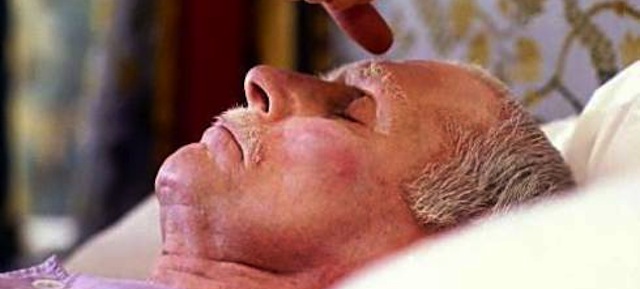
A beautiful turn of phrase from the author’s letters with Lady Mary Lygon, in reference to the death of Lord Marchmain (Hubert), the Flyte family patriarch, at the end of his masterpiece Brideshead Revisited:
“I believe that everyone in his (or her) life has the moment when he is open to Divine Grace. It’s there, of course, for the asking all the time, but human lives are so planned that usually there’s a particular time — sometimes, like Hubert, on his deathbed — when all resistance is down and Grace can come flooding in.”
The ending in question, which could not possibly be more powerful–especially in context–is told from the point of view of the skeptical Charles Ryder, and doubles as an account of Charles’ conversion:
“I recognized the words Ego te absolvo in nomine Patris…and saw the priest make the sign of the cross. Then I knelt, too, and prayed: ‘O God, if there is a God, forgive him his sins, if there is such a thing as sin,’ and the man the bed opened his eyes and gave a sigh, the sort of sigh I had imagined people made at the moment of death, but his eyes moved so that we knew there was still life in him. I suddenly felt the longing for a sign, if only of courtesy, if only for the sake of the woman I loved, who knelt in front of me, praying, I knew, for a sign. It seemed so small a thing that was asked, the bare acknowledgment of a present, a nod in the crowd. All over the world people were on their knees before innumerable crosses, and here the drama was being played again by two men – by one man, rather, and he nearer death than life; the universal drama in which there is only one actor…
…The priest took the little silver box from his pocket and spoke again in Latin, touching the dying man with an oily wad; he finished what he had to do, put away the box and gave the final blessing. Suddenly, Lord Marchmain moved his hand to his forehead; I thought he had felt the touch of the chrism and was wiping it away. ‘O God,’ I prayed, ‘don’t let him do that.’ But there was no need to fear; the hand moved slowly down his breast, then to his shoulder, and Lord Marchmain made the sign of the cross. The I knew the sign I had asked for was not a little thing, not a passing nod of recognition, and a phrase came back to me from my childhood of the veil of the temple being rent from top to bottom.”

COMMENTS
7 responses to “Evelyn Waugh on Resistance, Grace, and the Ending of Brideshead Revisited”
Leave a Reply













Love this quote. It very much describes the end of Brideshead. A few years ago, my wife and I watched the BBC miniseries with Jeremy Irons as Ryder. We were captivated.
Second Aaron's commnet. The BBC series may be the best miniseries ever…Julia's talk of sin left me speechless.
Dave (and others), I'd be interested to know what you thought of the recent remake of BR.
I chose not to watch the recent remake. I felt like the original (Jeremy Irons, Anthony Andrews, Claire Bloom, Laurence Olivier, and so on) — was so incredibly good, and on top of it was so much longer. I just didn't see the advantage to watching a movie with a lamer cast and an intensely abridged storyline.
Evelyn Waugh said that his entire book was a way of seeing how variously the grace of God worked out in all the lives of the principals: Charles, Sebastian, Lady Marchmain, Cordelia, and so on. Very different in each case, but the same grace and the same God.
Incidentally, the scenes between Rex (as a catechumen in the church of Rome) and Father Mowbray (giving him instruction) are priceless.
For example….
FM: Would you say that our Lord had more than one nature?
REX: Just as many as you say Father.
This was by far the best series I have loved, liked totally ,total emotional felling, like seeing a book read. At times I thought I was in Gone With The Wind. What acting . It will be hard to find an experience I felt during beyond BRIDESHEAD..I never wanted it to end.
I just finished watching the entire series of Brideshead Revisited and wish there were a sequel to the story. Each of the Marchmain family was affected by their Catholic faith. Some running away from it and suffering because they were doing so. It felt like their faith, except for Cordelia andd Bridey, was an enormous source of suffering and alienation from life. At the end Julia sacrificed Charles for God. That reminded me of another Catholic author Graham Greene’s End of the Affair where Julianne Moore promises God to end her affair with Ralph Fiennes if he lived. This is a familiar theme in the Catholicism in which I was raised. God was the taskmaster in the sky, the bearded one who had no compassion, no love for His children. Just a disciplinarian. Thankfully I left that God in favor of a God of love and forgiveness.
It seems Waugh had a rough time reconciling his human needs and wants with his Catholicism. I suspect his homosexuality was a source of great pain which he viewed as sin which was and is the Church’s position to this day. A greaat series.